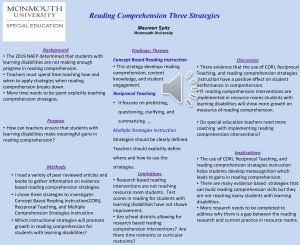Reading Comprehension Three Strategies Maureen Spitz Monmouth University


- Slides: 2

Reading Comprehension Three Strategies Maureen Spitz Monmouth University Background • The 2019 NAEP determined that students with learning disabilities are not making enough progress in reading comprehension. • Teachers must spend time teaching how and when to apply strategies when reading comprehension breaks down. • More time needs to be spent explicitly teaching comprehension strategies. Findings: Themes Concept Based Reading Instruction • This strategy develops reading comprehension, content knowledge, and student engagement. Reciprocal Teaching • It focuses on predicting, questioning, clarifying, and Purpose • How can teachers ensure that students with learning disabilities make meaningful gains in reading comprehension? summarizing. Multiple Strategies Instruction Strategies should be clearly defined. Teachers should explicitly define where and how to use the Methods • I read a variety of peer reviewed articles and books to gather information on evidence based reading comprehension strategies. • I chose three strategies to investigate: Concept Based Reading Instruction(CORI), Reciprocal Teaching, and Multiple Comprehension Strategies Instruction. • Which instructional strategies will promote growth in reading comprehension for students with learning disabilities? strategies. Limitations. • Research based reading interventions are not reaching resource room students. Test scores in reading for students with learning disabilities have not shown improvement. • Are school districts allowing for research based reading comprehension interventions? Are there time restraints or curricular restraints? Discussion • There evidence that the use of CORI, Reciprocal Teaching, and reading comprehension strategies instruction have a positive effect on student performance in comprehension. • If reading comprehension interventions are implemented in resource rooms students with learning disabilities will show more growth on measures of reading comprehension. • Do special education teachers need more coaching with implementing reading comprehension interventions? Implications • The use of CORI, Reciprocal Teaching, and reading comprehension strategies instruction helps students develop metacognition which leads to gains in reading comprehension. • There are many evidence based strategies that can build reading comprehension skills but they are not reaching many students with learning disabilities. • More research needs to be completed to address why there is a gap between the reading research and current practice in resource rooms.




